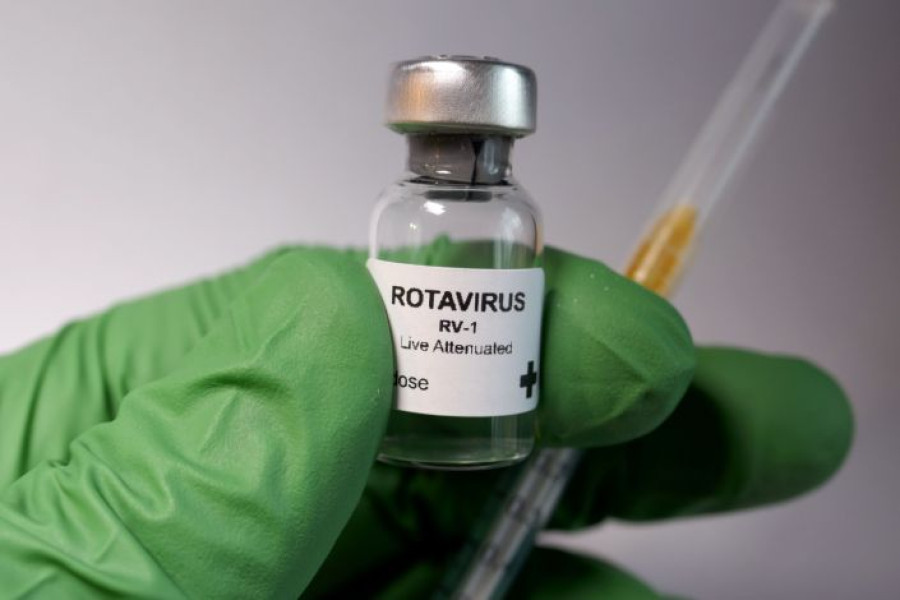Health
Rotavirus vaccine plan faces uncertainty as aid agency questions local governments’ capacity to spend
The vaccine is used to protect against rotavirus infections, which are the leading causes of severe diarrhoea among young children.
Arjun Poudel
The government’s plan to introduce rotavirus vaccines has become uncertain after the primary aid agency that committed to providing the vaccines raised questions about local and provincial governments’ capacity to spend aid money and possible embezzlement.
The vaccines can prevent rotavirus diseases—watery diarrhoea, vomiting, fever and abdominal pain—among infants and young children.
A proposal to introduce rotavirus vaccine was approved in 2017 and the Ministry of Health and Population had planned to introduce the vaccine throughout the country at once in 2018.
But even at the end of 2019, the plan is in limbo.
This year, the government had kept the rotavirus introduction programme in the red book, but the aid agency, the Global Alliance for Vaccines and Immunization (GAVI), has yet to confirm whether it will provide the vaccines and other support.
The Global Alliance for Vaccines and Immunization had committed to providing all required vaccines and initial operating cost of $0.85 per child.
"The alliance has asked the government to implement the programme through the World Health Organization, UNICEF or other private agency to introduced the vaccine instead of the agencies under three tiers of government—federal, provincial and local level," an official at the Health Ministry told the Post on condition of anonymity because he was not authorised to speak to the media. "The government should immediately hold a meeting with the alliance to convince it that several other health programmes are being conducted successfully by three tiers of government."
According to the official, the federal government could not request UN agencies or any other private institution to introduce the programme, as it is published in the red book.
Immunisation Section at the Family Welfare Division under the Department of Health Services confirmed that the final date of introduction of the rotavirus vaccine is yet to be ascertained, as the alliance has not responded to their proposal.
"The date of introduction of the vaccine is yet to be fixed. The alliance has not responded to our proposal," Dr Jhalak Sharma, chief of the section, told the Post. "We have already written to them about our plans.”
Diarrhoea is the most common illness among children and continues to be one of the major causes of childhood morbidity and mortality, according to the National Demographic Health Survey 2016.
The study shows that 6 percent of the children under the age of six months suffer from diarrhoeal infections. The infection rate sharply rises to 15 percent by the time they reach 11 months.
Of the total diarrhoeal cases, the virus causes 30 percent of total diarrhoea episodes in children under the age of five.
Under the programme that the government was planning to introduce, children will have been administered two doses of the oral vaccine in six weeks and 10 weeks during the regular immunisation schedule, according to Sharma.
Sharma, however, is hopeful that the vaccines could be launched in May next year if the alliance responds positively.
Apart from supplying the vaccines, the alliance will also help in training health workers on the vaccine administration and possible complications.
Dr Shyam Raj Upreti, a child health expert, said that the government should immediately hold talks with the aid agency and sort out the outstanding issues and doubts over the local and provincial governments’ capacity to run the programme and possible embezzlement of the funds.
"We have to reduce child mortality rate and achieve Sustainable Development Goal targets," said Upreti. "We should take the aid agencies on confidence and introduce the programme at the earliest."
Officials at the Ministry of Health and Population hope that the introduction of the new vaccine will help reduce diseases from rotavirus and possible deaths, ultimately helping the government achieve the goal of reducing the under-five mortality rate.
The mortality rate of children under five years in the country stands at 39 per 1,000 live births since 2016.
Earlier, the Health Ministry had carried out a trial of the vaccine at Kanti Children Hospital on the children suffering from the diarrheal infection caused by rotavirus.
Once the rotavirus vaccine is introduced, the number of vaccines administered to the children will reach 12.




 21.12°C Kathmandu
21.12°C Kathmandu















